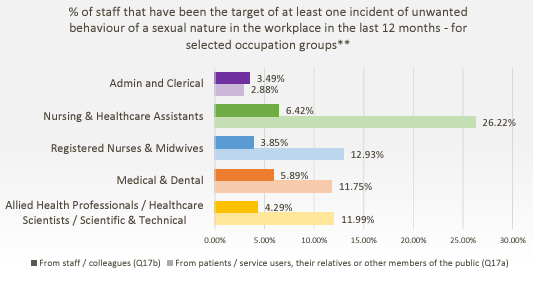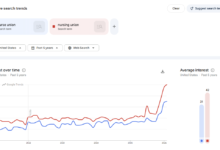Bank staff report high levels of harassment and violence

Nursing staff working on the bank are even more likely than their substantive colleagues to face sexual harassment in the workplace, the first NHS Staff Survey for bank workers reveals.
The findings, which cover 2023, show that nursing and healthcare assistants (HCAs) experienced more sexual harassment than any other professional group surveyed.
“These results shine a much-needed light on how NHS staff experiences can and must be improved”
Saffron Cordery
Just over a quarter (26%) of HCAs said they had been the target of at least one incident of unwanted behaviour of a sexual nature in the workplace in the last 12 months from patients, their relatives or the public, while 6% had experienced it from colleagues.
In the standard NHS Staff Survey 2023 for substantive staff, 17% of HCAs had experienced this behaviour from patients and the public and 4% from other members of staff.
Among registered nurses and midwives on the bank, 13% had faced unwanted sexual behaviour from patients and other members of the public compared with 11% of substantive nurses and midwives.
The percentage of nurses and midwives being sexually harassed by colleagues was similar among the bank and substantive groups at around 4%.
The bank worker NHS Staff Survey also revealed other areas where HCAs were worse affected than other professional groups on the bank including in the levels of physical violence they face at work.
While 24% of all NHS bank workers on average said they had experienced physical violence in the last 12 months from patients, their relatives or other members of the public, this figure was 50% when just looking at HCAs.
Registered nurses and midwives experienced the second highest level of violence at 24% compared with 16% of allied health professionals (AHPs) and scientific staff, 15% of medical and dental staff and 4% of admin staff.

A chart from the 2023 bank worker NHS Staff Survey
In addition, HCAs were less likely than other professional groups to feel supported to develop their potential, to say that they receive the respect they deserve from their colleagues, and to say their immediate manager gives them clear feedback on their work.
Across all professional groups, bank workers appeared to face higher levels of discrimination than their substantive equivalents.
In total, 13% of NHS bank workers reported personally experiencing discrimination at work in the last 12 months from patients, their relatives or other members of the public, while 10.5% said they had been discriminated against by managers, team leaders or other colleagues.
In comparison, in the 2023 NHS Staff Survey for substantive staff, 8% said they had endured discrimination from patients and the public, and 9% from managers or other colleagues.
The bank worker survey showed that the issue was worse for people from minority ethnic backgrounds.
According to the report, 7% of White bank workers had experienced discrimination from patients or the public compared with 25% of those from all other ethnic groups combined.
In terms of discrimination from colleagues, the figure was 7.5% among White bank workers and 16% for those in all other ethnic groups.
Meanwhile, satisfaction with pay was slightly higher among bank workers than substantive staff but still low overall.
Just over a third (34%) of bank staff said they were satisfied with their level of pay, compared with 31% of substantive staff.
However, more positively, 76% of bank workers who responded to the staff survey said they were enthusiastic about their job.
Just over two thirds (68%) said they would feel secure raising concerns about unsafe clinical practice.
When asked why they chose to work as a bank worker for the NHS, the most popular answer was because it offered them flexibility and control over their working arrangements.
In terms of their future intentions, most (72%) said they were planning to continue to work on the bank at their current organisation, while 24.5% were considering moving to a permanent contract in their workplace.
Unison national nursing officer Stuart Tuckwood said: “For so many nurses and healthcare assistants on the bank to be suffering sexual harassment is alarming.
“No NHS staff should have to face these sorts of incidents, and the frequency is far too high.”

Stuart Tuckwood
He urged organisations to adopt the NHS England sexual safety charter and “take meaningful action to protect their staff”.
Meanwhile, Mr Tuckwood warned that bank workers were often on “second-rate” terms and conditions.
“It’s little wonder healthcare assistants are frequently unhappy with their work. They deliver vital care to patients, but are largely undervalued and underpaid,” he said.
Unison is currently undergoing a campaign to win fair pay for HCAs who are working above their pay grade, which has seen thousands placed on a higher pay band.
However, Mr Tuckwood added that HCAs “need much more support in the workplace to enhance their potential, improve their skills and get greater recognition”.

Saffron Cordery
Responding to the findings, Saffron Cordery, deputy chief executive at NHS Providers, said: “These results shine a much-needed light on how NHS staff experiences can and must be improved.
“While most bank staff report enthusiasm for their jobs, it’s deeply concerning that so many have sexual safety concerns and face such high rates of discrimination from patients and families as well as from their managers and other staff.
“As unwanted behaviour of a sexual nature is also more prevalent for bank workers than permanent staff, it’s clear they need more targeted support.”
She said it was also “unacceptable” that bank workers from a minority ethnic background faced higher rates of discrimination than their White colleagues.
“There is no room for any form of discrimination or harassment in the NHS. Trusts are working hard to stamp out this behaviour but know more must be done,” she added.

Navina Evans
Dr Navina Evans, chief workforce, training and education officer for NHS England, said: “The first official staff survey for bank workers in the NHS shows a workforce that on the whole feels supported, valued and keen to stay working in the NHS and caring for patients – with one in four who responded saying they are planning to move into a permanent role.”
However, she said it was “wholly unacceptable” that so many respondents reported experiences of violence and discrimination.
Dr Evans added that “everyone working in the NHS should feel safe from discrimination or abuse, able to raise concerns, and be confident that concerns are taken seriously and acted on”.
She pointed to the NHS freedom to speak up policy and violence prevention and reduction tool as resources available to staff and employers to address these issues.






